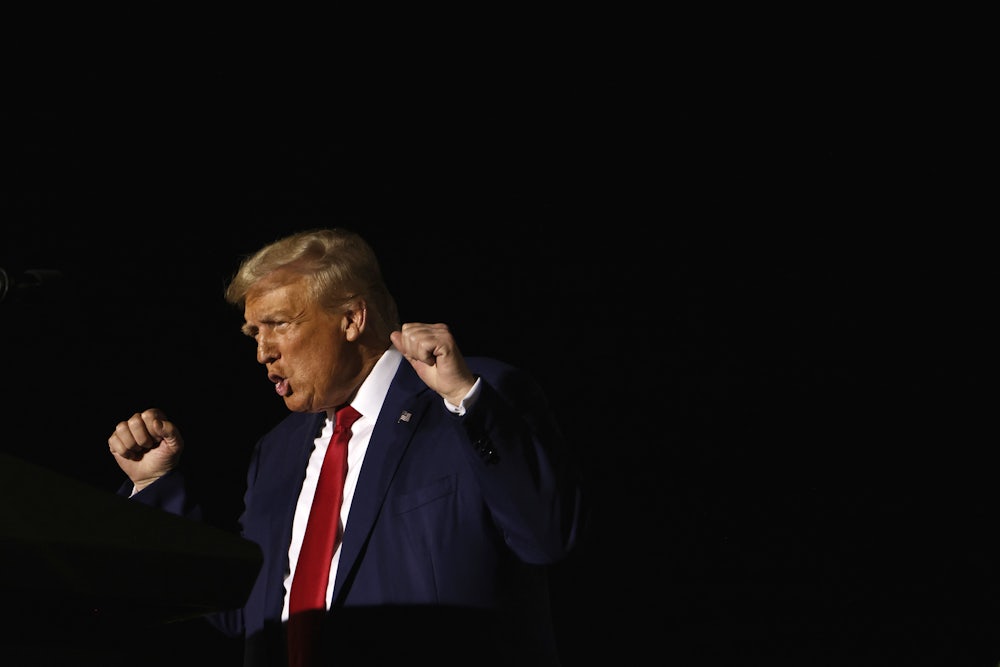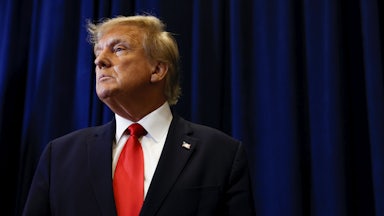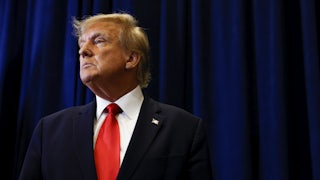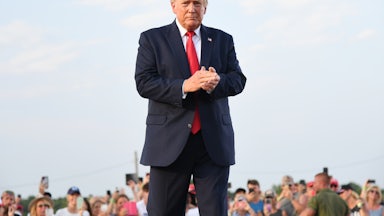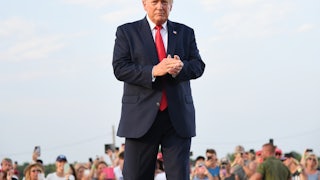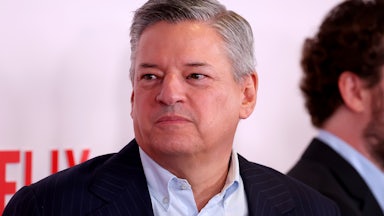On Friday, a Colorado court delivered its anticipated ruling on whether former President Donald Trump was constitutionally ineligible to run for a second presidential term. The court had been asked to consider whether Trump could be excluded from future political office based on his involvement in the January 6 attacks on the U.S. Capitol, an argument that has gained traction after a pair of conservative legal scholars wrote an influential law-review article on it in August. Reading the Colorado court’s ruling, on the other hand, is like watching DeSean Jackson catch a spectacular pass for what would have been a game-winning touchdown, then throw away the ball one step before crossing the goal line.
A group of Colorado voters sued the state’s secretary of state earlier this fall, arguing that Colorado was obligated to remove Trump from the presidential primary ballot. They argued that his role in the aforementioned attacks on the Capitol, as well as the events leading up to it, fell under the Fourteenth Amendment’s disqualification provisions in Section Three. Trump later intervened in the lawsuit to defend himself and his actions.
Judge Sarah Wallace sided with the voters at every single step of the lawsuit. Then she decided not to cross the goal line. “The Court holds there is scant direct evidence regarding whether the Presidency is one of the positions subject to disqualification,” she wrote, referring to the offices listed in Section Three. As a result, she concluded that Trump must stay on the ballot and the lawsuit must be dismissed.
Up until that point, Wallace had ruled in favor of the plaintiffs on almost every point. She rejected Trump’s various procedural efforts to dismiss the case on procedural grounds. She admitted the House January 6 committee’s final report into evidence despite Trump’s claims of bias and inaccuracy, concluding that Trump had failed to disprove its factual findings. She also ruled that some of Trump’s witnesses, including loyalist aide Kash Patel, were “not credible” in the testimony they gave to the court during its own hearings.
Based on that evidence, Wallace concluded that Trump had played a significant role in the violence on January 6, 2021. “The Court finds that by sending otherwise non-violent protestors to the Capitol, thereby increasing the mob’s numbers through his actions and words, Trump materially aided the attack on the Capitol,” she wrote. She recounted Trump’s history of encouraging political violence and welcoming its results, which Trump had tried to downplay as ordinary political rhetoric.
Wallace also rejected the Trump legal team’s claim that his actions were protected by the First Amendment and therefore couldn’t be subject to disqualification. She noted that Trump had not simply spoken in general terms about “fighting back” or “winning the battle,” as people and politicians often do in a metaphorical sense. She noted that Trump had specifically summoned a mob to Washington, D.C., on January 6 as the electoral votes were counted and directed it to the Capitol to stop the count. Trump, she concluded, “acted with the specific intent to incite political violence and direct it at the Capitol with the purpose of disrupting the electoral certification.”
All of this led to her landmark conclusion that Trump had, in fact, participated in an insurrection under the terms of Section Three on January 6. “Consequently, the Court finds that Petitioners have established that Trump engaged in an insurrection on January 6, 2021 through incitement, and that the First Amendment does not protect Trump’s speech,” she concluded. That should have been enough to conclude he was disqualified from future office under the Fourteenth Amendment.
Then came the fumble. In the end, Wallace ruled that Trump couldn’t be disqualified for a strange reason: The presidency, she concluded, wasn’t clearly among the government positions listed in Section Three. The clause describes three specific groups of positions from which a candidate can be disqualified: “senator[s] or representatives in Congress,” “electors of President or Vice President,” and, finally, “any office, civil or military, under the United States, or under any state.”
This list, the judge concluded, does not appear to include the president or vice president. “To lump the presidency in with any other civil or military office is odd indeed and very troubling to the Court because as Intervenors point out, Section Three explicitly lists all federal elected positions except the President and Vice President,” she wrote. “Under traditional rules of statutory construction, when a list includes specific positions but then fails to include others, courts assume the exclusion was intentional.”
This interpretation was championed by Trump’s legal team as well as some Trump-adjacent legal scholars. It is nevertheless an absurd contention. For one thing, how does the office of the president not fall under “any office, civil or military, under the United States”? That sweeping categorization would appear to cover every public servant in all three branches of government as well as the military. And though this portion isn’t as relevant to this case, it also captures every executive, legislative, and judicial office “under any state,” meaning the state governments.
That breadth highlights the absurdity. Under this reading, a then-current or former officeholder who stormed the Capitol on January 6 would be constitutionally ineligible to serve as a U.S. senator from California, a governor of Texas, a mayor in upstate New York, a city dog-catcher in Ohio—but not as president of the United States. An insurrectionist can’t serve as an ambassador or as secretary of state but could appoint people to those positions. An insurrectionist, under this reading, would even be barred from military service but not from serving as commander-in-chief.
Two conservative law scholars, William Baude and Michael Stokes Paulsen, also foresaw this argument and dismissed it out of hand. “No one denies that the President is an executive branch officer holding executive office,” they wrote. “At the risk of belaboring the obvious: Article II refers to the ‘office’ of President innumerable times. It specifies the length of term for which the President ‘holds his Office,’ certain minimum qualifications for eligibility ‘to that Office,’ what happens upon the President’s removal ‘from Office,’ or inability to discharge ‘the Powers and Duties of said Office,’ and the oath he shall take before entering ‘on the Execution of his Office.’ If the Presidency is not an office, nothing is.”
The two scholars even quoted from the amendment’s ratification debates, where the possible absence of the president from the list of disqualified offices was commented upon. They also discuss the vice president, but that question is not at issue here and is likely secondary to whatever the ruling for the president may be. In terms of conveying the “intent” of an amendment’s framers, the exchange is as clear as one will likely ever find.
Senator Reverdy Johnson of Maryland charged that the language employed was defective because the offices of President and Vice President had inadvertently been omitted from Section Three. The amendment “does not go far enough,” Johnson averred. “I do not see but that any one of these gentlemen may be elected President or Vice President of the United States, and why did you omit to exclude them?” Johnson was complaining that these two officers should be included in Section Three and there was no good reason to omit them. Whereupon Senator Morrill of Maine interrupted: “Let me call the Senator’s attention to the words ‘or hold any office, civil or military, under the United States.’” Senator Johnson promptly, and somewhat sheepishly, retreated: “Perhaps I am wrong as to the exclusion from the presidency; no doubt I am; but I was misled by noticing the special exclusion in the case of Senators and Representatives.”
Wallace appears to have made the very same mistake as Johnson when reading the amendment in the 1860s. She then compounded her error by noting, as if in anticipation of the criticism that she would receive, that she was simply hesitant to remove Trump from the ballot. “To be clear, part of the Court’s decision is its reluctance to embrace an interpretation which would disqualify a presidential candidate without a clear, unmistakable indication that such is the intent of Section Three,” Wallace wrote.
Wallace, to her credit, built a comprehensive factual record to make the job easier for appellate courts when they review her ruling. A judge’s general reluctance to intervene in the electoral process is also understandable. It may even be laudable. But Section Three does not ask her or any other judge to disqualify Trump from office. His actions have already satisfied the terms of Section Three. The plaintiffs only ask that the judge not let disqualified candidates onto the ballot. And since her “reluctance” has overcome the best reading and interpretation of the Fourteenth Amendment, it will now fall to Colorado’s appeals courts to carry the ball into the end zone.
